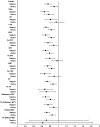Cardiovascular outcomes in adult patients with atrial septal defect: a nationwide population-based study
- PMID: 40959496
- PMCID: PMC12434082
- DOI: 10.3389/fcvm.2025.1633002
Cardiovascular outcomes in adult patients with atrial septal defect: a nationwide population-based study
Abstract
This study aimed to investigate the long-term effects of different ASD closure methods on cardiovascular events in adults. A retrospective analysis was conducted using data obtained from the Korean National Health Insurance Service, focusing on patients aged ≥20 years diagnosed with ASD between 2004 and 2015. Participants were categorized into the observation, device closure, and surgery groups. Propensity score matching (PSM) was employed to mitigate imbalances among the groups. The Cox proportional hazards model was utilized to compare the occurrence of major adverse cardiovascular events (MACE), including stroke, myocardial infarction (MI), coronary revascularization, and all-cause death. In total, 20,643 patients with ASD were included in this study. After PSM, there were 6,636 in the observation group and 3,318 each in the device closure and surgery group. Over a 5-year follow-up period, the adjusted hazard ratios for MACE were significantly lower in the surgery (0.72; 95% CI: 0.66-0.79) and device closure groups (0.85; 95% CI: 0.78-0.92) than in the observation group. Beneficial effects on stroke and all-cause mortality were observed in both intervention groups. Additionally, a beneficial effect on coronary revascularization was observed in the surgery group, whereas the impact on MI was not significantly different between the groups. ASD closure, whether by surgery or using a device, is associated with a decreased incidence of cardiovascular outcomes in adults. The benefits on cardiovascular outcomes vary with the type of closure method, underscoring the need for a tailored approach to manage ASD in adults.
Keywords: adult congenital heart disease; atrial septal defect; cardiovascular outcome; device; surgery.
© 2025 Lee, Park, Jung and Shin.
Conflict of interest statement
The authors declare that the research was conducted in the absence of any commercial or financial relationships that could be construed as a potential conflict of interest.
Figures




References
LinkOut - more resources
Full Text Sources
Miscellaneous

